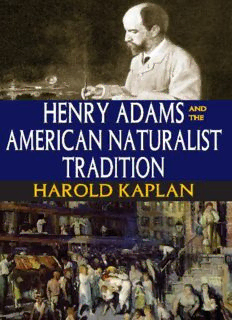
Henry Adams and the American Naturalist Tradition PDF
Preview Henry Adams and the American Naturalist Tradition
Originally published in 1981 by the Chicago University Press. Published 2011 by Transaction Publishers Published 2017 by Routledge 2 Park Square, Milton Park, Abingdon, Oxon OX14 4RN 711 Third Avenue, New York, NY 10017, USA Routledge is an imprint of the Taylor & Francis Group, an informa business New material this edition copyright © 2011 by Taylor & Francis. All rights reserved. No part of this book may be reprinted or reproduced or utilised in any form or by any electronic, mechanical, or other means, now known or hereafter invented, including photocopying and recording, or in any information storage or retrieval system, without permission in writing from the publishers. Notice: Product or corporate names may be trademarks or registered trademarks, and are used only for identification and explanation without intent to infringe. Library of Congress Catalog Number: 2010012822 Library of Congress Cataloging-in-Publication Data Kaplan, Harold, 1916- [Power and order] Henry Adams and the American natural tradition / Harold Kaplan. p.cm. Originally published under title: Power and order : Henry Adams and the naturalist tradition in American fi ction. Chicago : University of Chicago Press, c1981. Includes bibliographical references and index. ISBN 978-1-4128-1423-2 (alk. paper) 1. American fi ction--19th century--History and criticism. 2. Adams, Henry, 1838-1918--Criticism and interpretation. 3. Power (Social sci- ences) in literature. 4. Order (Philosophy) in literature. 5. Naturalism in literature. I. Title. PS374.N29K36 2010 813’.009’12--dc22 2010012822 ISBN 13: 978-1-4128-1423-2 (pbk) For learning, to my mother and to Raymond Sanford Contents Preface ix 1. Th e Myth of Power 1 2. Th e Naturalist Ethos 13 3. Henry Adams: Th e Metapolitics of Power and Order 37 4. Th e Dehumanization of Politics 65 5. Naturalist Fiction and Political Allegory 85 6. Vitalism and Redemptive Violence 115 7. “Godlike Reality”: A Testing and Truthful Violence 131 Notes 169 Index 183 Preface To treat of the relation between literature and politics has its obvi- ous dangers, apart from the risk of becoming easily drowned in controversy. Even the most sophisticated political theory works at odds with the literary imagination, for discursive politics has an irrepressible tendency to create abstractions, while any literature of merit moves almost always toward the rejection or revision of those general ideas that have entered the public domain as stereotypes. This is a warning to be kept in mind by all students who engage in the project of seeing literature from the perspective of politics. It seems to me, however, that the reverse way of putting the issue helps toward the solution of the difficulties. To see politics from the perspective of literature is to find the ground where they actually coexist, that is, where they share a source in cultural myth. Modern theoretical politics in the West has been led by an ambition to achieve metaphysical status and philosophic universality. At least since the democratic revolutions of the eighteenth century, ideol- ogies have taken on the character of secular religions, and the strongest political currents of this century and the last have surely confirmed and heightened that development. Marxism, for in- stance, as generally practiced and as it has influenced intellectual life, has made as wide a claim for relevant authority in all spheres of human existence as any universalist myth or dogma that we know, including that of the Virgin of Chartres, even as she was drawn in Henry Adams's imaginative portrait of her and her civilization. This is again to suggest that the politics that meets literature on the deepest level, beyond mere description or propaganda, is a meta- politics, one founded on premises that link nature and human history and approach teleological design. I was drawn to the study of American naturalist fiction written at the turn of the century exactly because it offered an unusually instructive example of how such a system of thought, founded on neoscientific premises and offering neopolitical conclusions, could affect the literary imagination. The works of Dreiser, Crane, and Norris that I treat here were all published within a period of eight years, beginning in 1893, with Crane's Maggie, and ending with ix
Description: